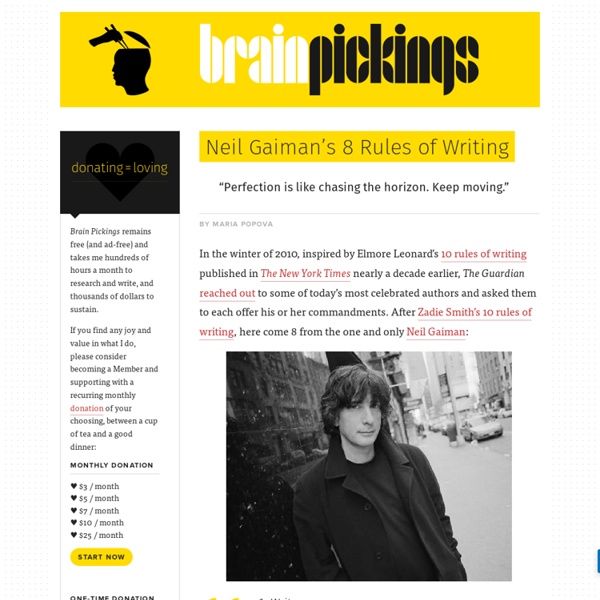What I’ve Learned as a Writer
By Leo Babauta I’ve been a professional writer since I was 17: so nearly 24 years now. I’ve made my living with words, and have written a lot of them — more than 10 million (though many of them were duplicates). That means I’ve made a ton of errors. Lots of typos. Lots of bad writing.
The Nature of Fun: David Foster Wallace on Why Writers Write
by Maria Popova “Fiction becomes a weird way to countenance yourself and to tell the truth instead of being a way to escape yourself or present yourself in a way you figure you will be maximally likable.” On the heels of the highly anticipated new David Foster Wallace biography comes Both Flesh and Not: Essays (public library) — a collection spanning twenty years of Wallace’s nonfiction writing on subjects as wide-ranging as math, Borges, democracy, the U.S.
HOW TO WRITE GOOD
Caveat emptor. Carpe diem. O si villi, si ergo, fortibus es in ero. Et tu, brute. by Frank L. Visco
Jim Butcher On Writing
Jim Butcher's posts on the art and craft of writing are the best I've read and have been of enormous help to me. I often recommend these posts but haven't found any one place where all the URLs are listed. True, most of them can be found on Jim's Livejournal blog but they appear (as one would expect) in reverse order and there's no index.
Anne Lamott’s Timeless Advice on Writing and Why Perfectionism Kills Creativity
by Maria Popova “Perfectionism is the voice of the oppressor, the enemy of the people. It will keep you cramped and insane your whole life.” Anne Lamott’s Bird by Bird: Some Instructions on Writing and Life (public library) is among my 10 favorite books on writing — a treasure trove of insight both practical and profound, timelessly revisitable and yielding deeper resonance each time. Lamott adds to the collected wisdom of great writers with equal parts candor and conviction, teaching us as much about writing as she does about creativity at large and, even beyond that, about being human and living a full life — because, after all, as Lamott notes in the beginning, writing is nothing more nor less than a sensemaking mechanism for life:
Why I Write: George Orwell's Four Motives for Creation
by Maria Popova “All writers are vain, selfish, and lazy, and at the very bottom of their motives there lies a mystery.” Literary legend Eric Arthur Blair, better known as George Orwell, remains best remembered for authoring the cult-classics Animal Farm and Nineteen Eighty-Four, but he was also a formidable, masterful essayist. Among his finest short-form feats is the 1946 essay Why I Write (public library) — a fine addition to other timeless insights on writing, including Kurt Vonnegut’s 8 rules for a great story, David Ogilvy’s 10 no-bullshit tips, Henry Miller’s 11 commandments, Jack Kerouac’s 30 beliefs and techniques, John Steinbeck’s 6 pointers, and various invaluable insight from other great writers. I give all this background information because I do not think one can assess a writer’s motives without knowing something of his early development.
Nominalizations Are Zombie Nouns
Draft is a series about the art and craft of writing. Take an adjective (implacable) or a verb (calibrate) or even another noun (crony) and add a suffix like ity, tion or ism. You’ve created a new noun: implacability, calibration, cronyism. Sounds impressive, right? Nouns formed from other parts of speech are called nominalizations. Academics love them; so do lawyers, bureaucrats and business writers.
How To Write A Novel Using The Snowflake Method
Writing a novel is easy. Writing a good novel is hard. That’s just life. If it were easy, we’d all be writing best-selling, prize-winning fiction.
Writer as Coder: The Iterative Way to Write a Book
By Leo Babauta The traditional way of writing a book is like the old Microsoft model of developing software: you write it in isolation for a year or two, and then put it out as a fully-formed product. The problem with that method is that it’s never been tested in the real world. You don’t know if readers (or users) will want it, you don’t know where you’ve made huge mistakes, you don’t know how it will work in the wild.
Six Tips on Writing from John Steinbeck
By Maria Popova If this is indeed the year of reading more and writing better, we’ve been right on course with David Ogilvy’s 10 no-nonsense tips, Henry Miller’s 11 commandments, and various invaluable advice from other great writers. Now comes Pulitzer Prize winner and Nobel laureate John Steinbeck (February 27, 1902–December 20, 1968) with six tips on writing, originally set down in a 1962 letter to the actor and writer Robert Wallsten included in Steinbeck: A Life in Letters (public library) — the same magnificent volume that gave us Steinbeck’s advice on falling in love. Steinbeck counsels: Abandon the idea that you are ever going to finish.
Why “Show, Don’t Tell” Is the Great Lie of Writing Workshops
I’m honored and excited today to be bringing you a guest post by critically acclaimed novelist and writing instructor Joshua Henkin. I first discovered Henkin’s work years ago when I received an advance copy of his novel Matrimony at Book Expo America, and I later enjoyed having him contribute a thought-provoking essay on the art of storytelling to Writer’s Digest magazine (in fact, two of his writing tips from that piece made our Top 20 Writing Lessons From WD list in 2009). I invited Joshua Henkin to be our guest this week in celebration of the release of his brand-new novel, The World Without You. His topic of choice—a sound argument for breaking the “Show Don’t Tell” rule of writing—is a perfect extension of my post last week about How to Break the Rules of Writing.



